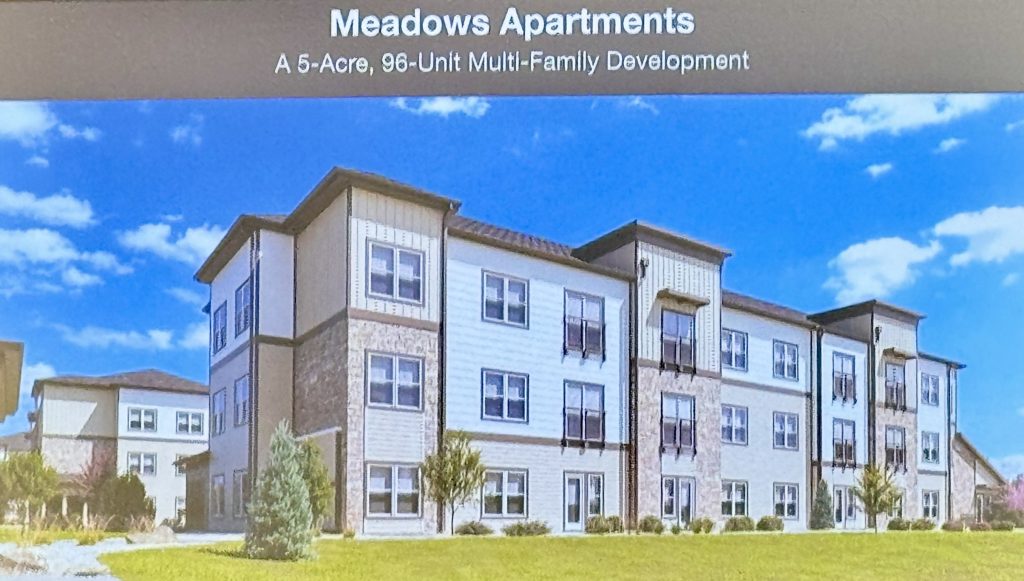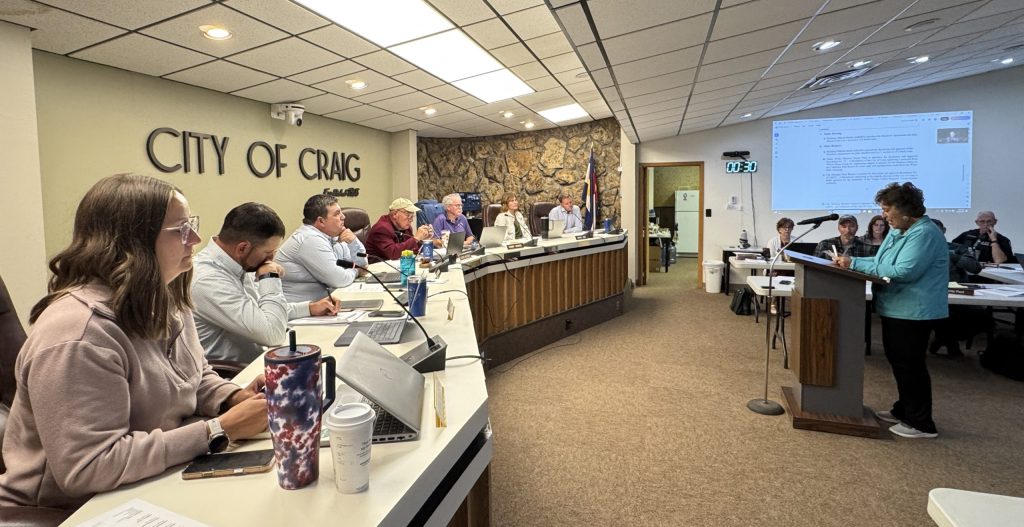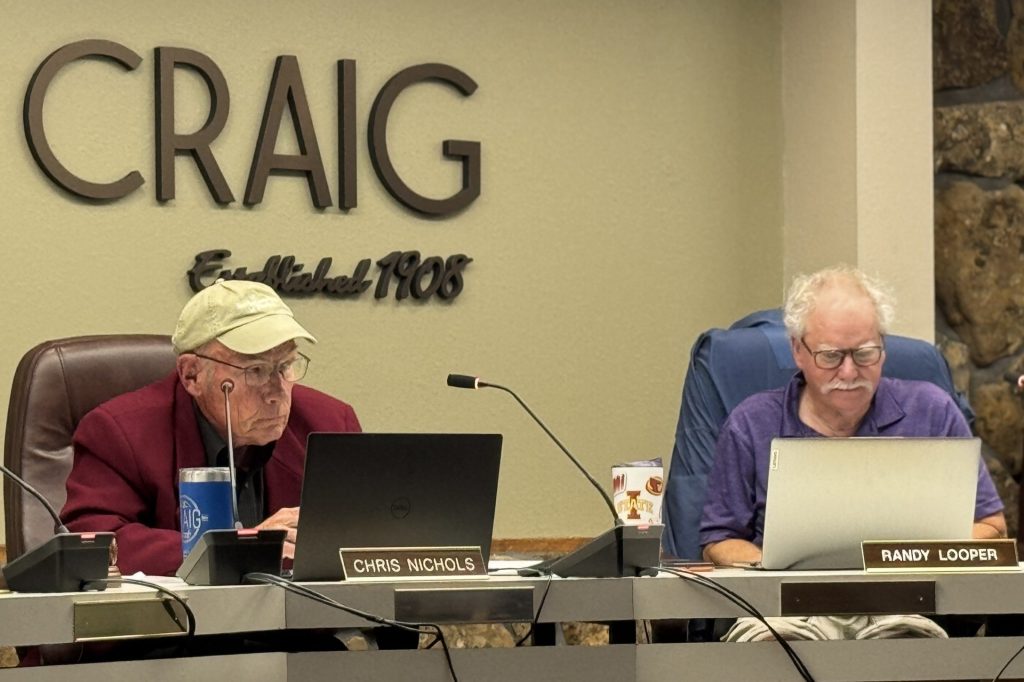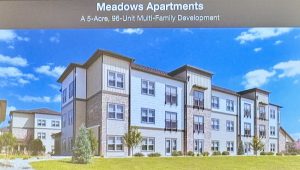Craig City Council gives nod to Meadows Apartments site plan, sends RTA and marijuana tax to voters

John Camponeschi/Craig Daily Press
The Craig City Council passed significant measures during its Aug. 26 meeting, including an approval of the Meadows Apartments site plan. The same meeting also saw the council send a Regional Transportation Authority question, as well as a proposed increase in marijuana sales tax, to voters in November.
Meadows Apartments
A large portion of the meeting centered around a public hearing, and subsequent final site plan approval, for the 96-unit Meadows Apartments project on Mack Lane.
The development has drawn high levels of attention from city residents regarding traffic, infrastructure, affordability and potential neighborhood impacts.
Several residents voiced concerns during public comment about safety and traffic congestion around Woodbury Park.
Joanne Robertson, who lives on Mack Lane and spoke during public comment, said that she felt that “the traffic studies did not represent the reality of it all.”
“We see what you don’t see … lots of cars, trucks, 18-wheelers, motorcycles, four-wheelers and racers going up and down the street all hours of the day and night, speeding and racing,” she said during public comment. “It’s very dangerous for pedestrians, especially kids, and we’ve seen some near accidents. Someone is going to get hurt or worse.”

She said that, with the addition of new residents, Mack Lane should be renamed “Mack Highway.”
Traffic was a central topic of discussion during the hearing, with questions arising regarding the conclusions of two formal studies which were conducted over the summer. Craig Police Chief Michael Cochran said officers have been taking action to protect public safety and reduce speeding.
“We’re very active with citations. As a matter of fact, on Third Street as well, we have officers that set out there frequently and stop cars. And as was pointed out, when you see the speed trailer, sometimes they slow down,” he said. “That’s the reason we’ve started leaving it out for a week at a time, because sometimes then they get comfortable and don’t slow down anymore.”
During public comment, Memorial Regional Health Chief Operating Officer Kyle Miller noted that the health care facility was offering full support for the “proposed multifamily development.”
“One of the challenges health care has is affordable housing and recruiting health care professionals to our region is really one of the biggest limitations,” Miller said. “So we’re challenged with this on a daily basis as it comes to recruiting not only just health care professionals, but our ancillary support staff and our allied staff that also provide care to patients in our community.”
Building Official Marlin Eckhoff said infrastructure requirements had been reviewed with the developer and emphasized that new utilities would be installed under city easements.
“That will be within a city easement, and part of the one condition that I have in your memo there that I would propose, and that Planning and Zoning also recommended is … to make sure that we have those easements in place prior to any building permits,” Eckhoff said.
He also noted that the Planning and Zoning Commission, which had met on Aug. 18, had recommended the site plan be approved in a 5-0 vote.
Council members pressed for clarification on water lines and fire hydrants, with Mayor Nichols stating “we don’t want any more privately owned, unmaintained fire hydrants.”
Nichols acknowledged skepticism around the traffic findings but said the council relied on expert review.
“I can’t dispute it. I’m not a traffic engineer,” said Nichols. ” … I know we can keep discussing and say we don’t agree, but the numbers are there.”
Nichols went on to emphasize that the developer exceeded city standards.
“I again applaud the developer for exceeding, not just meeting, but exceeding standards,” he said.
Tension in the room rose as Councilmember Randy Looper moved that the site plan be approved, with Councilmember Jesse Jackson quickly seconding the motion.
Following brief additional discussion, the site plan was approved by the council on a 6–1 vote, with Councilman Luke Tucker casting the lone “nay.”
In emails to the Craig Press following the meeting, council members clarified the reasoning for their votes on the Meadows site plan.
“My ‘nay’ vote on the Meadows apartment complex is based on my continued concerns about the grant dollars that the city is responsible for,” he wrote. “These grants have strings attached that require the AMI restrictions, of which, I’m not a fan. I also don’t think the city should be picking winners and losers of who receives these grant dollars. My view is every industry, whether it be health care, higher education, and now housing that is heavily reliant on government dollars are the ones experiencing the most inflation.”
Councilmember Derek Duran said that it was “important for the public to know what the voting item was.”
“We were voting to approve the Meadows site plan, not whether we thought the community needed the apartments or not. I voted in favor of the site plan due to the fact the proposed site plan met or exceeded all requirements per the City of Craig Land Use Code and the proposed project is zoned correctly for that area.”
Mayor Nichols added that the council had “no legal authority to deny the site plan since they exceeded our standards.”

“Two separate traffic studies performed during different times of the year showed Mack Lane had the capacity to account for the added volume,” he said. “Since some grant funds are being used, that requires that this project remains workforce housing meeting 80 to 140% AMI for 30 years to ease the community’s concerns.”
Michelle Gottschall noted that her decision to vote in favor of the project was not taken lightly.
“When this project was first proposed, I had concerns, particularly regarding the rezoning of open park space and ensuring that the affordability levels truly met the needs of local working families,” she wrote. “Since then, significant changes have been made. The location no longer impacts public parkland, and the income requirements have been updated to better reflect the people who live and work in Craig, our teachers, hospital staff, police officers and other essential workers.
Regional Transportation Authority
Council then unanimously approved Resolution No. 25 (2025), which will submit a ballot question regarding the Yampa Valley Regional Transportation Authority to Craig voters this fall.
City Manager Peter Brixius explained that the resolution included the finalized intergovernmental agreement, ballot language and service goals such as more frequent buses on U.S. Highway 40 between Craig and Steamboat Springs, a new circulator bus route within Craig and connections to Yampa Valley Regional Airport.
Looper said Craig’s participation was critical.
“Basically, what it’s doing is allowing us to create the RTA, and it gives us a voice at the table,” he said. “If we decide not to move this forward or it is not passed, either one, that means that more than likely it will move forward without Craig having a say. So that’s the number one most important part of this.”
He also described a new pledge from Steamboat Ski and Resort Corp. guaranteeing $1 million in contributions during the first three years if the RTA is approved. If a proposed lift tax in Steamboat passes, the pledge would be nullified and replaced by the city’s funding.
Nichols said sending the issue to the ballot was about letting residents have the final say.
“It’s something that the electorate will make the determination on,” he said.
Council approved the resolution 7–0.
Marijuana sales tax
The Craig City Council also approved a second reading of Ordinance 1167 (2025), sending a proposed increase in the sales tax on retail marijuana to voters in the November election. The ordinance sets the rate at “a capped amount of up to 4%” and clarifies that the tax will be reviewed annually.
City Attorney Heather Cannon revised the ballot language after the measure was tabled earlier this month.
Assistant City Attorney Gary Rhoden, who sat in for Cannon at the meeting, explained the changes.
Council voted unanimously to advance the measure to the November ballot.
Looking ahead
With the approval of the Meadows Apartments site plan, the city has moved closer to adding what many view as an essential multifamily housing project. At the same time, voters will soon weigh in on two questions with long-term implications regarding whether the city should join a regional transportation district and whether marijuana sales should carry an additional tax.
The November ballot will give Craig residents the final word on both the transportation and marijuana tax measures, even as development decisions being made by the city council continue to shape the Craig’s future.

Support Local Journalism

Support Local Journalism
Readers around Craig and Moffat County make the Craig Press’ work possible. Your financial contribution supports our efforts to deliver quality, locally relevant journalism.
Now more than ever, your support is critical to help us keep our community informed about the evolving coronavirus pandemic and the impact it is having locally. Every contribution, however large or small, will make a difference.
Each donation will be used exclusively for the development and creation of increased news coverage.









